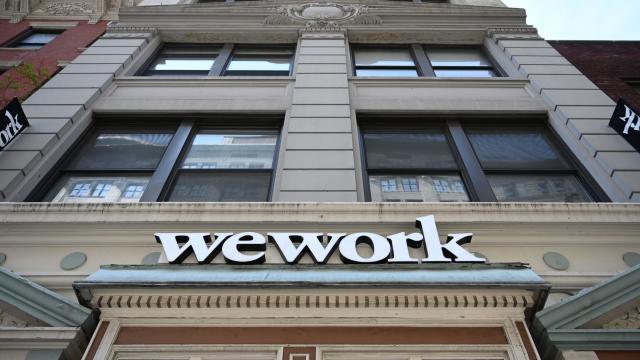Leadership at WeWork knew that the company’s custom phone booths had elevated amounts of formaldehyde for months before it warned its customers about sitting inside the small toxic cells, according to a report from Bloomberg.
Most WeWork members learned in mid-October that the phone booths posed a potential health hazard when the company sent out a mass email saying it was removing hundreds of booths from many of its offices due to high levels of formaldehyde—an embalming agent that is often used in building materials
beautiful pic.twitter.com/tFyNStaEcN
— bradley babendir (@therealbradbabs) October 14, 2019
At the time, a spokesperson told Gizmodo that when “a member informed us of odor and eye irritation, WeWork performed an analysis, including having an outside consultant conduct a series of tests on a sampling of phone booths,” adding that “we are working to remedy this situation as quickly as possible.”
However, the Bloomberg report suggests WeWork could have worked much more quickly. According to the article, WeWork first found out about the phone booth issues soon after one of its largest customers, UBS Group AG investment bank, alerted WeWork of a strange odor in its office in Weehawken, New Jersey, which contained many WeWork-designed phone booths. Two unnamed sources told Bloomberg that after the bank learned of the odor concerns, an inspector found that the pods contained heightened formaldehyde levels. UBS then reportedly replaced the booths, as exposure to high levels of formaldehyde can cause respiratory issues, and possibly enhance cancer risks.
WeWork continued to allow its members to use hundreds of the toxic booths in offices in the U.S. and Canada through October.
[referenced url=” thumb=” title=” excerpt=”]
WeWork did not immediately respond to a Gizmodo request for comment. “We are in the process of conducting additional testing on a sampling of these phone booths,” a WeWork spokesperson told Bloomberg. “We regret the impact this issue has had on members at some of our locations, and we are working to remedy this situation as quickly as possible.”
The U.S. Occupational Safety and Health Administration was not able to provide a comment on this matter by time of publication.
University of Connecticut law professor Alexandra Lahav told Gizmodo that if WeWork members could prove they had an injury associated with formaldehyde and had been exposed to the phone booths—and if the company in fact knew about the high formaldehyde levels and didn’t warn members—then those members could bring claims against the company.
“You see it in other cases where companies become aware of hazards and don’t communicate it. And it does end up creating liability for them,” Lahav said. “People really don’t like this kind of behaviour on the part of companies. It is better to have a corporate culture where you do warn people.”
But consumer protection attorney Cory Zajdel suggests that WeWork is protected in this situation.
“WeWorks’ membership agreement contains a waiver of claims for personal injury, limits its liability to the prior year’s rent, includes a class action waiver and requires any dispute to be resolved in a confidential arbitration proceeding,” consumer protection attorney Cory Zajdel told Gizmodo. “For these reasons, WeWork is probably not that concerned about the monetary implications of its failure to inform users and guests of this critical health risk in a timely manner.”
Hopefully, all WeWork members who were exposed to the carcinogenic capsules will escape harm, just as WeWork has.
